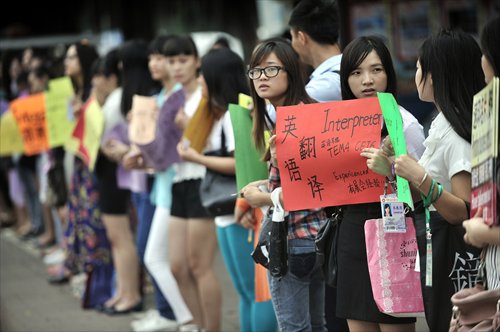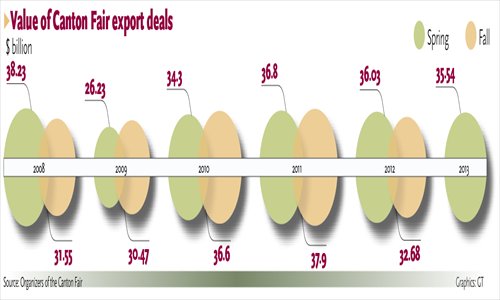HOME >> BUSINESS
Numbers fall again as Canton Fair opens
By Chen Tian Source:Global Times Published: 2013-10-15 23:23:01

College students look for job opportunities as interpreters Monday near the venue for the Canton Fair, which opened Tuesday in Guangzhou. Photo: CFP

The number of exhibitors at the fall session of the China Import and Export Fair, which opened Tuesday, dropped for the second consecutive session, with more and more companies turning to e-commerce platforms to find trade partners.
The biannual event, also known as the Canton Fair, takes place every spring and fall in Guangzhou, capital of South China's Guangdong Province. The fair is seen as an indicator for the Chinese mainland's export performance in the following six months to a year.
The fall session attracted 24,517 exhibitors, 229 less than the spring session. The number of exhibitors at the fair's export section declined to 23,975 in October, down by 209 from May.
Bai Ming, a research fellow at the Chinese Academy of International Trade and Economic Cooperation, told the Global Times Tuesday that an increasing number of businesses are using e-commerce platforms, such as alibaba.com, to market their products and make deals.
"It is more cost-efficient for companies, especially small and medium-size enterprises, to use business-to-business (B2B) websites, because the firms usually do not sign large, profitable contracts at trade fairs, and they can avoid transportation and other costs by just using the Internet to find buyers," Bai said.
Chinese companies signed deals worth 2 trillion yuan ($327.64 billion) with foreign partners on B2B websites in 2012, a 25 percent increase from 2011, according to data provided by the China E-Commerce Research Center.
However, Liu Jianjun, a spokesperson for the Canton Fair, said Monday that e-commerce will not have a significant impact on the traditional means of face-to-face trading in the short term, and it will not replace trade fairs in the long run.
Since this spring, the Canton Fair has started using a self-run online platform to organize the product information for exhibitors and match the sellers with potential foreign buyers, the Shanghai-based National Business Daily reported Tuesday.
A subdued global economy and weaker growth in emerging markets have been eating into China's exports, which fell by 0.3 percent year-on-year to $185.65 billion in September. This also cut the number of exhibitors at the Canton Fair, Bai said.
Zhou Bin, a professor at the Shanghai University of International Business and Economics, told the Global Times Tuesday that even fewer exhibitors will be interested in attending mass trade fairs in the future.
"Now many companies have stable partners around the world to manufacture different elements of their goods to minimize production costs, so there is no point for them in setting up a stall in Guangzhou and looking for new partners," Zhou said.
Both Zhou and Liu said that specialized trade fairs in fields such as textiles and heavy machinery elements will gain more popularity compared with mass events like the Canton Fair.
Posted in: Economy